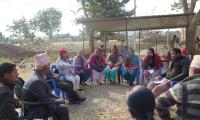Bringing human rights defenders into official statistics

Inclusive SDG Data Partnerships is led by the Danish Institute for Human Rights (funded by the Permanent Mission of Denmark to the United Nations in Geneva), Partners for Review (hosted by GIZ) and the International Civil Society Centre.
Official and reliable data that shed light on the increased numbers of killings and harassment of human rights defenders in the Philippines; and the generation of official data on gender and youth in Nepal. This will hopefully be among the important results of an initiative called Inclusive SDG Data Partnerships, co-created by the Institute.
The initiative strengthens the collection and use of data from non-official sources through new, country-based alliances in Costa Rica, the Philippines, the Palestinian Territories, Nepal, Canada and Ghana. The partnerships comprise national statistics offices, civil society organisations and national human rights institutions. Together they identify what kinds of data are missing on specific issues and people, and plan how to fill the data gaps.
As an example, in Nepal the Central Bureau of Statistics and the National Human Rights Commission among others are planning to introduce and teach youths and women on how to generate data on their situations. Furthermore, they are planning to generate qualitative data on marginalised communities.
Accelerating a rights-based implementation of the 2030 agenda
The new partnerships can play a pivotal role in accelerating action towards implementation of the 2030 Agenda based on human rights, which in many areas is far too slow. Many SDG targets and indicators in areas of key importance for human rights remain unmonitored and under-reported.
With official statistics focusing mostly on national averages, there is a significant monitoring gap of marginalised communities and of specific groups such as indigenous peoples, women, children, and human rights defenders. The main purpose of the new partnerships is to fill these data gaps.
